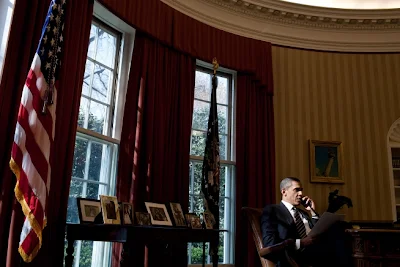Until now I've resisted joining the media panic regarding oral arguments before the Supreme Court which seemed to suggest 5 of the Justices were set to overturn the Affordable Care Act. Since the decision is not expected until June, I thought there would be plenty of time for cooler constitutional heads to prevail, and the evident political energy displayed this week would give way to judicial scholarship, which has overwhelmingly supported the constitutionality of the Act and specifically the so-called individual mandate, under the Commerce clause, in the same way that Social Security and Medicare were found constitutional.
They would also have time to learn more about health care, health insurance and what they mean in the American economy--knowledge which some who studied the questions they asked doubt that they now have. They would have time to discuss all this, and share what they've learned, what their reasoning is.
But then I saw this piece, which says that they may well make their decision without talking to each other at all, and that the decision will probably be made almost immediately. Maybe today. We just won't find out about it until June, in the thick of the pre-conventions presidential campaign.
So in the heat of this moment, I am obliged to take seriously the prospect that this politicized court will ignore virtually every constitutional scholar's view that the Act easily falls within established law, and essentially roll back 80 years of progress, such as it is. On the basis of a radically reactionary reinterpretation of the Constitution, this Court could substitute itself for the other two branches of government in a matter that has vast economic and social repercussions.
The prospect has shocked many commentators, but I will let one speak for all, since E.J. Dionne's column drips with the contempt that this process so far deserves. He uses the words "judicial dictatorship," and that's the prospect we're facing. Having overturned the outcome of the 2000 election, and having institutionalized the single greatest threat to electoral democracy in our history with its Citizens United decision, this Supreme Court threatens to take over the government outright.
To do so in a presidential election year would be to make that even more obvious, and would turn the 75% of American who believe that the Court makes its decisions based on politics into 99%.
But the most specific impact will be on the U.S. health care system and the economy. Gone will be restrictions on denying coverage for preexisting conditions. Gone will be coverage extended to young adults on their parents policies. And most of all, gone for a very long time will be the hope that the rank injustices and utter cruelties of health insurance in America will be stopped.
Ezra Klein offers the long-term hope that defeat of this admittedly complex law will lead to a single-payer system, but he doesn't expect that process to even begin for 10 years. So another generation will have to endure rising costs, declining insurance coverage. More Americans will go bankrupt paying for overpriced health care. More American will die because they cannot afford medical care, or even basic insurance. As Klein writes, "in the decades between here and there, there will be a lot of unnecessary suffering and deaths among the uninsured. That’s the real cost of losing this opportunity to insure 30 million people. And it’s a cost that too often gets swept under the rug in Washington’s handicapping of the political fallout."
And that's before the forces behind this Court and the Paul Ryan budget destroy medical care coverage for the most vulnerable population, older Americans, as they set about hollowing out Medicare until nothing remains of it but a phony name.
Given the challenges this country will face in the near future--those associated with the Climate Crisis in particular--this could be crippling, in what it does and what it portends. The coming election is really about whether we're propelling ourselves into a new Dark Age, or reaffirming the movement away begun in 2008. But this Court itself could--with a decision made on this very day--take that into its own hands, and carry this country a giant step in the direction of darkness.
Is the Story of Sports the Story of Injuries?
-
A lot has happened to the teams I follow in just a few weeks. The
Pittsburgh Steelers were ignominiously defeated by the Houston Oilers in
their wild ca...
1 week ago

















